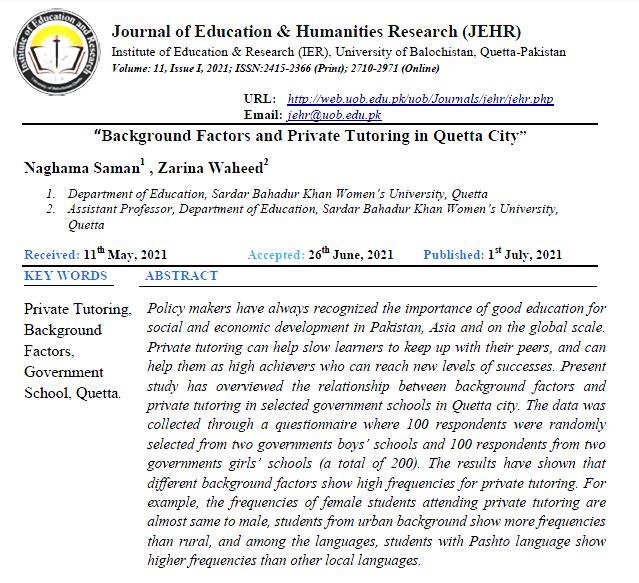Background Factors and Private Tutoring in Quetta City
Keywords:
Private Tutoring, Background Factors, Government School, Quetta.Abstract
Policy makers have always recognized the importance of good education for social and economic development in Pakistan, Asia and on the global scale. Private tutoring can help slow learners to keep up with their peers, and can help them as high achievers who can reach new levels of successes. Present study has overviewed the relationship between background factors and private tutoring in selected government schools in Quetta city. The data was collected through a questionnaire where 100 respondents were randomly selected from two government boys schools and 100 respondents from two government girls schools (a total of 200). The results have shown that different background factors show high frequencies for private tutoring. For example, the frequencies of female students attending private tutoring are almost same to male, students from urban background show more frequencies than rural, and among the languages, students with Pashto language show higher frequencies than other local languages.
References
Andrabi, T., Das, J., & Khwaja, A. . (2002). The Rise of Private Schooling in Pakistan : Catering to the Urban Elite or Educating the Rural Poor ?, 1–36.
Aslam, M. (2007). The relative effectiveness of government and private schools in Pakistan : are girls worse off ? RECOUP Working Paper 4 The Relative Effectiveness of Government and Private Schools in Pakistan : Are Girls Worse Off ?
Aslam, M., & Kingdon, G. G. (2008). Gender and household education expenditure in Pakistan. Applied Economics, 40(20), 2573 — 2591. https://doi.org/10.1080/00036840600970252
Azam, M. (2016). Private Tutoring: Evidence from India. Review of Development Economics, 20(4), 739–761.
Bray, M., & Kwok, P. (2003). Demand for private supplementary tutoring : conceptual considerations , and socio-economic patterns in Hong Kong, 22, 611–620. https://doi.org/10.1016/S0272-7757(03)00032-3
Bray, M. (2017). School factors underlying demand for private supplementary tutoring in English: urban and rural variations in Bangladesh.
Buchmann, C., (2002). Getting ahead in Kenya: social capital, shadow education, and achievement. In Schooling and social capital in diverse cultures. Amsterdam: JAI Press.133–159.
Chan, C., & Bray, M. (2014). Title Marketized private tutoring as a supplement to regular schooling : Liberal Studies and the shadow sector in Hong Kong secondary education Chan , C ; Bray , TM Author ( s ) Citation Journal of Curriculum Studies , 2014 , v . 46 n . 3 , p . 361-388 Th. Journal of Curriculum Studies, 46(3), 361–388.
Dang, H., (2007). The determinants and impact of private tutoring classes in vietnam. Econ. Educ. Rev. 26, 683–698.
Elbadawy, A., Council, P., Assaad, R., & Ahlburg, D. (2007). Private and Group Tutoring in Egypt : Where is The Gender Inequality ? PRIVATE AND GROUP TUTORING IN EGYPT : WHERE IS THE GENDER INEQUALITY ? Asmaa Elbadawy , Ragui Assaad , Dennis Ahlburg and Deborah Levison Working Paper 0429 October 2007 Asmaa Elbadawy, (January).
Fergany, N., (1994). Survey of access to primary education and acquisition of basic literacy skills in three governorates in Egypt. Cairo: UNICEF; Almishkat Centre for Research and Training. 12, 123-125.
George, C., (1992). Time to come out of the shadows. Straits Times (Singapore), 4 April.
Hon, H. (2010). Hong Kong’s shadow education: Private tutoring in Hong Kong. Hong Kong Anthropologist, 4, 62–85.
Jelani, J., & Tan, A. K. G. (2012). Determinants of participation and expenditure patterns of private tuition received by primary school students in Penang, Malaysia: An exploratory study. Asia Pacific Journal of Education, 32(1), 35–51. https://doi.org/10.1080/02188791.2012.655238
Nath, S. R. (2008). Private supplementary tutoring among primary students in Bangladesh. Educational Studies, 34(1), 55–72. https://doi.org/10.1080/03055690701785285
Ray, M. B., & Wo, O. K. (2014). Regulating Private Tutoring for Public Good: Policy Options for Supplementary Education in Asia. Comparative Education Research Centre The University of Hong Kong.
Sahito, Z., Khawaja, M., Siddiqui, A., Shaheen, A., & Saeed, H. (2017). Role of Tuition Centers in the Performance and Achievement of Students : A Case of Hyderabad District , Sindh , Pakistan. Journal of Education and Training Studies, 5(4), 90–102. https://doi.org/10.11114/jets.v5i4.2262
Suleman, Q., & Hussain, I. (2014). Effects of Private Tuition on the Academic Achievement of Secondary School Students in Subject of Mathematics in. Journal of Education and Learning, 8(1), 29–40.
Wan, C. Da, & Weerasena, B. (2017). Shadow Education in Malaysia: Identifying the Determinants of Spending and Amount of Time Attending Private Supplementary Tutoring of Upper Secondary School Students. Journal of International and Comparative Education, 6(2), 91–103. https://doi.org/10.14425/jice.2017.6.2.91




